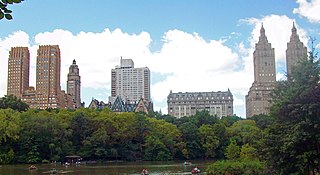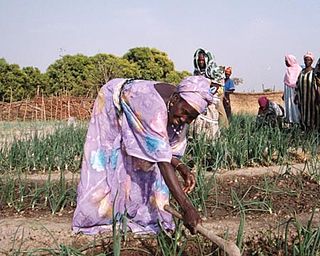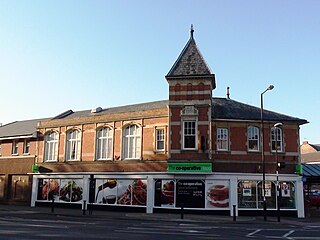
A cooperative is "an autonomous association of persons united voluntarily to meet their common economic, social and cultural needs and aspirations through a jointly owned and democratically-controlled enterprise". Cooperatives are democratically controlled by their members, with each member having one vote in electing the board of directors. Cooperatives may include:

A housing cooperative, or housing co-op, is a legal entity, usually a cooperative or a corporation, which owns real estate, consisting of one or more residential buildings; it is one type of housing tenure. Typically housing cooperatives are owned by shareholders but in some cases they can be owned by a non-profit organization. They are a distinctive form of home ownership that have many characteristics that differ from other residential arrangements such as single family home ownership, condominiums and renting.
A utility cooperative is a type of cooperative that is tasked with the delivery of a public utility such as electricity, water or telecommunications to its members. Profits are either reinvested for infrastructure or distributed to members in the form of "patronage" or "capital credits", which are dividends paid on a member's investment in the cooperative.

Agricore United, Inc. was a farmer-directed agribusiness in Canada. It supplied crop nutrition and crop protection products, and offered grain handling and marketing services. It was created on November 1, 2001 by the merger of Agricore and United Grain Growers. It was headquartered in Winnipeg, Manitoba. Its shares were publicly traded on the Toronto Stock Exchange (TSX) under the symbol "AU" until June 15, 2007, when it was taken over by the Saskatchewan Wheat Pool. Agri-business giant Archer Daniels Midland (ADM) had a 28% stake in the company at the time of the takeover.

An agricultural cooperative, also known as a farmers' co-op, is a producer cooperative in which farmers pool their resources in certain areas of activity.
Southern States Cooperative is an American farmer-owned agricultural supply cooperative headquartered in the Richmond, Virginia area. Southern States Cooperative supplies small, medium, and large commercial farmers with livestock and animal feed, pasture seed, vegetable seed, farm fertilizers, farm supplies, bulk fuel, and crop services, including information and products to grow better crops. They also supply homeowners with information and products for their lawn, garden, hobby farm, and home.
The United Kingdom is home to a widespread and diverse co-operative movement, with over 7,000 registered co-operatives owned by 17 million individual members and which contribute £34bn a year to the British economy. Modern co-operation started with the Rochdale Pioneers' shop in the northern English town of Rochdale in 1844, though the history of co-operation in Britain can be traced back to before 1800. The British co-operative movement is most commonly associated with The Co-operative brand which has been adopted by several large consumers' co-operative societies; however, there are many thousands of registered co-operative businesses operating in the UK. Alongside these consumers' co-operatives, there exist many prominent agricultural co-operatives (621), co-operative housing providers (619), health and social care cooperatives (111), cooperative schools (834), retail co-operatives, co-operatively run community energy projects, football supporters' trusts, credit unions, and worker-owned businesses.

A consumers' co-operative is an enterprise owned by consumers and managed democratically and that aims at fulfilling the needs and aspirations of its members. Such co-operatives operate within the market system, independently of the state, as a form of mutual aid, oriented toward service rather than pecuniary profit. Many cooperatives, however, do have a degree of profit orientation. Just like other corporations, some cooperatives issue dividends to owners based on a share of total net profit or earnings ; or based on a percentage of the total amount of purchases made by the owner. Regardless of whether they issue a dividend or not, most consumers’ cooperatives will offer owners discounts and preferential access to good and services.
A food cooperative or food co-op is a food distribution outlet organized as a cooperative, rather than a private or public company. Food cooperatives are usually consumer cooperatives, where the decisions regarding the production and distribution of its food are chosen by its members. Like all cooperatives, food cooperatives are often based on the 7 Rochdale Principles, and they typically offer natural foods. Decisions about how to run a cooperative are not made by outside shareholders, therefore cooperatives often exhibit a higher degree of social responsibility than their corporate analogues.
Davis Campus Co-ops (DCC) is a nonprofit organization whose mission is to provide low-cost cooperative housing for students attending University of California, Davis. Today, DCC owns one student housing cooperative called Pacifico Student Cooperative Housing, located in South Davis. In 2006, DCC partnered with the North American Students of Cooperation and the City of Davis to provide stronger cooperative education and management support. Governance of DCC is now coterminous with the NASCO Properties Board of Directors.
The history of the cooperative movement concerns the origins and history of cooperatives across the world. Although cooperative arrangements, such as mutual insurance, and principles of cooperation existed long before, the cooperative movement began with the application of cooperative principles to business organization.
People's Food Co-op or just the People's Co-op is a food cooperative located in Portland, Oregon. Founded in 1970 by the members of a food-buying club, the co-op is owned by over 3000 member-owners and is a member of the National Cooperative Grocers Association and the United States Federation of Worker Cooperatives.
Wiregrass Electric Cooperative is a not-for-profit rural electric utility cooperative headquartered in Hartford, Alabama. It is a member of the Alabama Rural Electric Association of Cooperatives (AREA) and the National Rural Electric Cooperative Association.

Wilco is a farmer-owned farm supply cooperative that began as the Santiam Farmers Co-op in the 1930s based in the Willamette Valley of the U.S. state of Oregon. In 1967, the Santiam Farmers Co-op merged with 4 other co-ops, the Mt. Angel Farmers Union Warehouse, the Donald Farmers Co-op, the Valley Farmers Co-op in Silverton, and the Canby Cooperative to form "Wilco Farmers Coop". The name "Wilco" comes from a shortening of "Willamette Consolidated".
The Co-op Refinery Complex (CRC), formerly known as Consumers’ Co-operative Refineries Limited (CCRL), is an oil refinery spread over 544 acres (2.20 km2) located in the city of Regina, Saskatchewan, Canada, owned and operated [source needed] by Consumers Co-operative Refinery Limited, an affiliate of Federated Co-operatives Limited (FCL). The refinery provides oil products to the member co-operatives of Federated Co-operatives Limited as well as most other petroleum retailers in the region including major national and regional brands. The complex completed a CA$2.9 billion upgrade project in 2012 to increase operations up to 145,000 barrels per day (23,100 m3/d)

The Oberlin Student Cooperative Association (OSCA) is a non-profit corporation founded in 1962 that feeds and houses Oberlin College students. Located in the town of Oberlin, Ohio, it is independent from but closely tied to Oberlin College. OSCA is one of the largest student housing cooperatives in North America, though membership has declined in recent years.

Citizens Co-op was a food cooperative, or a community owned market located in Gainesville, Florida. It closed in 2016 due to financial issues.
The Minnesota Food Cooperative Wars took place in 1975-1976 time period and revolved around the many food cooperatives in the Twin Cities region of Minnesota. Initially, the disputes and confrontations within the Twin Cities Cooperative movement were not referred to as "Wars", but the nomenclature developed in part as a result of the title of a documentary made decades later.








